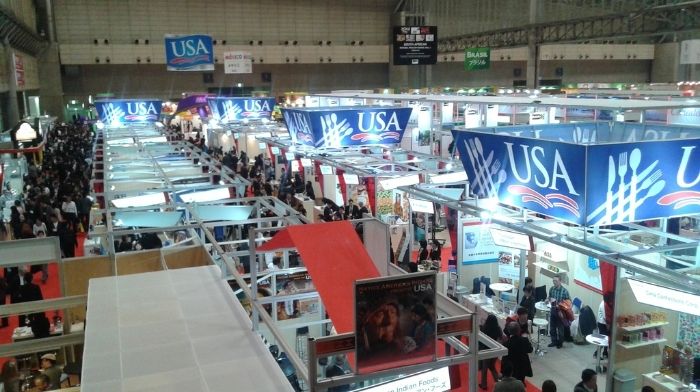
COUNTRY PROFILE
Discover more about the Australian market including overviews about the retail, foodservice, and food-processing sectors. Events, resources, and more are linked throughout the profile.

8th
top market for U.S processed foods

$977.8 Million
total of U.S. processed foods imports in 2023
Focus Economics reports that Australia boasts a prosperous, Western-style capitalist economy, with a per capita gross domestic product (GDP) among the highest in the world. The services sector accounts for the largest share of GDP, although agriculture and mining significantly contribute to exports. The country has a high standard of living and regularly ranks close to the top in global comparisons of national performance on metrics such as quality of life, health, education, economic freedom, and the protection of civil liberties and political rights.
Barring the pandemic-induced contraction in 2020, Australia’s economy has experienced non-stop growth for decades, supported by pro-market economic policies, large inward migration flows, and improving trade ties with a booming Asian economy. Australia’s large reliance on trade with China is a risk at a time when China is turning inwards economically, and tensions with the West are on the rise. Moreover, Australia is at risk from extreme weather, with wildfires and flooding becoming more widespread and damaging in recent years. In addition, Australia is not currently maximizing the value of some of its commodities, such as lithium, due to a lack of domestic refining capacity, something the government wishes to change.
Australia’s economic outlook is favorable, buoyed by a large and growing consumer market, abundant natural resources, and a stable economic environment, and annual GDP growth should exceed 2% in the coming years. Euromonitor International, a market research provider, reports that following robust GDP growth of 3.9% in 2022, growth dropped to 2% in 2023 and the forecast is for growth of 1.3% in 2024.
Australia’s population is steadily rising and reached 26.4 million in 2023 (CIA World Factbook Est.), up from 19.4 million in 2000. The median age in 2023 was 37.9 years, 2.5 years higher than in 2000. It will rise to 38.3 years by 2030. Immigration is an important contributor to population growth. More than a fifth of all Australians were born overseas and over a quarter of those born in Australia have at least one parent who was born overseas. Most of today’s immigrants come from Asia. The population of those over 65 years has more than doubled since 1980 and numbered 4.4 million in 2023 (16.7% of total population). By 2030, the share will be 18.2%.
USDA’s Office of Agricultural Affairs in Canberra, hereinafter referred to as FAS Post Canberra, reports that Australia is an open market with minimal restrictions on imports of goods and services. The process of opening up has increased productivity, stimulated growth, and made the economy more flexible and dynamic. Australia plays an active role in the World Trade Organization (WTO), Asia-Pacific Economic Cooperation (APEC), the Group of 20, (G20), and other trade forums. Australia’s free trade agreement (FTA) with China entered into force in 2015, adding to existing FTAs with the Republic of Korea, Japan, Chile, Malaysia, India, Singapore, Thailand, and the U.S., and a regional FTA with ASEAN and New Zealand. Australia is a member of the new 11-member Comprehensive and Progressive Agreement for Trans-Pacific Partnership (CPTPP), which was formally created in March 2018. The new agreement excludes the U.S.
In January 2022, the Regional Comprehensive Economic Partnership (RCEP) came into force, creating a new Asia Pacific trading bloc between the 10 ASEAN (Association of Southeast Asian Nations) countries, Australia, China, Japan, New Zealand, and South Korea. The RCEP is expected to boost Australia’s economic development and promote stronger trading relationships between members through the effects of tariff reductions and simplification of trading rules. In addition, in April 2022, Australia and India signed the Australia-India Economic Cooperation and Trade Agreement (IA-ECTA), which came into effect in December 2022. The agreement is expected to strengthen bilateral trade ties between the two countries and present major opportunities for Australian export-orientated businesses.
Australia also ranks eighth in the world for U.S. exports of processed foods, totaling US$1 billion in 2022, which was growth of 16% from that of 2021. In 2023 U.S., exports of processed foods to Australia dropped 10% to US$977.8 million. That equates to over US$98 million, which adds to the U.S. trade deficit in food and agricultural products.
Top U.S. processed food exports to Australia in 2023 included:

$37 Billion
estimated total of retail sales of packaged food products in 2023

18%
increase in retail sales since 2019

$45.1 Billion
estimated in sales of packaged food products by 2028
According to Euromonitor, retail sales in the packaged food market in Australia reached US$37 billion in 2023. That represents a growth rate of 18% or US$5.6 billion since 2019. By the year 2028, the retail sales in the packaged food market in Australia is expected to reach US$45.1 billion, a growth rate of 16.7% and US$5.4 billion from 2024.
High growth products in the forecast include:
FAS Post Canberra reports that although Australia is experiencing rising inflation, supermarket and grocery store incomes are benefitting by largely passing the price increases on to customers. Profit margins in supermarkets and grocery stores rose by 4.2% in 2022. The value of Australian consumer-oriented (i.e., snack foods, breakfast cereals, meat and poultry, dairy, eggs and products, fresh fruit and vegetables, processed fruit and vegetables, fruit and vegetable juices, nuts, wine, beer, nursery products, pet food, etc.), fish, and seafood imports totaled US$14.5 billion in 2022. The U.S. accounted for US$1.4 billion or 10% of Australia’s total food related imports. Most of Australia’s imports in these sectors are sourced from New Zealand, and the United States is the second largest supplier.
Consumer aspirations, both personal and social, along with product developments by suppliers and retailers, continue to be important influences on shopping choices. For example, Sustainability: Consumers support products and brands that address concerns for better environmental outcomes. Food producers and retailers have made considerable investments in sustainability platforms. Waste reduction: Consumers desire to reduce household food waste. Integrity of food production systems: Consumers have supported products positioned to resonate with them (such as free-range egg, poultry, and meat products). Healthy eating: The high profile given to obesity has increased the awareness of managing portion sizes.
The supermarket industry is one of the most fiercely competitive sectors in Australia with Coles and Woolworths accounting for 64% of the market. In recent years, there has been rapid growth from German-owned ALDI and American-owned Costco, which is continuing to affect the industry. Changing consumer sentiment and shopping preferences have also influenced the industry’s trading conditions. Shoppers have shifted their shopping habits over the last decade with some of the key determinants being food safety, location, and good value.
Most grocery shopping is still conducted in the major supermarkets with consumers preferring convenience over supporting local and independent outlets. However, shoppers indicated that local greengrocers and markets hold sentimental value, and they would choose to go to them, if possible, for their fresh fruit and vegetable purchases. Supermarkets and grocery stores continue to maintain most of the retail food market share, at around 61%. The market share of cafés, restaurants and takeaway food outlets is around 27%, reflecting consumers’ continued desire for convenience. Other food retailers, such as butchers and bakeries, remain relatively stable with around 5% market share.
Aggressive pricing initiatives taken by the major supermarket retailers in recent years are expected to last for the longer term, although other factors such as loyalty programs and online sales are also coming into play. Competition within grocery retailing is expected to intensify with aggressive discounting continuing to be used to appeal to value-conscious consumers.
Warehouse clubs made an appearance in the Australian marketplace following the launch of Costco’s first store in Melbourne in 2009 and its expansion since to all main cities across Australia. This presents a further challenge to value gains for supermarkets. Costco remains the only warehouse club in the Australian market and offers a variety of U.S. and Australian products.
Convenience stores focus on providing a daily routine stop for consumers, with an emphasis on driving visit frequency through selling freshly prepared hot food and drinks to attract time-pressed customers. The industry only includes businesses that primarily sell convenience store goods and excludes all service (gas) stations and is therefore highly fragmented and diverse, with a significant number of owner-operated enterprises that include stores operating under banner groups and franchise agreements which are usually run as individual businesses.
Convenience stores in Australia are facing growing competition from smaller-sized supermarkets. Best exemplified by the Woolworths Metro and Coles Local formats, these smaller outlets are increasingly found in busy inner-city locations and densely populated suburban areas. Like convenience stores, they target time-pressed consumers who tend to shop more frequently but buy fewer items at a time. Crucially, however, smaller supermarkets generally offer lower prices, while some also serve as “click and collect” points for online customers.
Independent small grocers have been the most affected by the strong industry competition over the past few years. The COVID-19 pandemic also impacted this sector as consumers turned to services such as home delivery and click-and-collect not offered by these smaller players. Most industry exits have been from this sector. This channel will remain at a competitive disadvantage to supermarkets due to the weaker buying power and economies of scale of the larger businesses. Independent players are also unable to match the marketing budgets of larger retailers and will therefore struggle to compete.
FAS Post Canberra reports that prospects already in the market with good sales potential include distilled spirits, cheese, dog and cat food, baked snack foods (pastries, pretzels, etc.), and chocolate.

$40 Billion
total commercial foodservice sales
FAS Post Canberra reports that 2022 saw the start of the post-pandemic recovery for the hospitality industry in Australia. The Australian consumer foodservice industry was valued at US$40 billion in 2022. Staff shortages and inflation hit the foodservice industry with new challenges in 2022 that strained the industry’s growth.
The Australian restaurant industry is highly fragmented and dominated by many small operators who face competition from other restaurants and operators in other hospitality sectors, such as cafes and pubs. Changing consumer behavior during COVID-19, labor shortages, and increased operating costs due to inflation have led many operators to restructure their operations by expanding takeaway menus, reducing portion sizes, and reviewing menus. Online food delivery services supported the industry during lockdowns and have allowed the restaurant sector to compete with other sectors, such as fast food. Rising inflation has meant that consumers currently have lower discretionary income available. This situation has meant that the focus of high-end, full-service restaurants has shifted towards more middle-tier outlets in the short term.
Australia’s coffee culture and a growing number of specialty cafes and coffee shops have contributed to high industry competition. An establishment’s success largely depends on its customer service, the price and quality of its products, and the overall café experience. Coffee quality is crucial, with the coffee brand, texture, temperature, and milk type becoming increasingly important to customers. There is also an increased focus on fair trade and organic coffee.
Consumer health awareness has transformed this sector with increased awareness of the nutritional content of fast food and a conscious effort by consumers to choose healthier options affecting industry demand. Industry operators have responded by introducing a range of nutritious, premium choices with less fat, sugar, and salt. This change in consumer preferences has also led to new operators offering higher quality fast-food options including salad and juice bars, and sushi stores. The shift towards healthier choices and a “foodie” culture has led to smaller operators differentiating themselves based on quality. This trend has led to more gourmet options in the fast-food market and new food options previously considered restaurant meals.
Most hotel industry operators in this sector derive a significant portion of revenue (20% to 25%) from selling meals and beverages prepared at onsite restaurants. Some hotels promote their restaurants and dining establishments as a major attraction. Some of Australia’s major hotels, notably upscale brands, are attached to high-end restaurants and other foodservice options that aim to provide guests with onsite dining selections. Many hotels and resorts in Australia are locally owned and operated, but several large foreign companies with large portfolios are in the market. These include AAPC Ltd (trading as Accor Asia Pacific), the industry’s largest operator; Event Hospitality and Entertainment Ltd (Rydges, QT, and Atura brands); Hilton International Australia; Holiday Inns Holdings (Australia) Pty Ltd (Australian subsidiary of InterContinental Hotels Group); and Marriott International Inc.
FAS Post Canberra reports that U.S. products with good sales potential in the Australian HRI sector include dairy products: cheese, whey, and ice cream; distilled spirits: such as whiskey, vodka, and gin; fresh fruit: grapes, oranges, and kiwi fruit; and processed products: snack foods, bread, pastry, mixes, and doughs.
FAS Post Canberra reports that Australia’s food processing industry is the largest manufacturing sector in the country. It is comprised of over 16,000 enterprises and employs over 272,000 people. The sector’s revenue is mainly generated by large companies. The food manufacturing turnover for 2021-2022 was US$87 billion.
The food, beverage and grocery sectors are the largest manufacturing sectors in Australia, accounting for one-third of all manufacturing activity. The food manufacturing turnover for
2021-2022 reached US$80.4 billion. The industry is comprised of over 16,000 enterprises (excluding those in the fresh produce sector) and employs over 272,000 people. There is a large representation of sole traders and small- and medium-sized enterprises (SMEs). Although there are many SMEs, they only account for a small portion of the sector’s turnover and employment.
The Australian market is very “Americanized,” with most U.S. food categories compatible with
Australian tastes, providing many opportunities for U.S. exporters. Due to the size of the U.S. market, it is possible for U.S. manufacturers to develop a range of products far beyond that which can be achieved in Australia. This enables U.S. exporters to deliver innovative product lines that are otherwise not available, for example food colors and flavors. There are many opportunities for imported products in the Australian food processing market and many ways in which to gain market access.
Processed/cured meat products: Increases in prices of fresh meat has meant that price conscious consumers have turned to processed/cured products as a cheaper alternative. Processed pig meat and pork for further processing has been progressively allowed into Australia since 1990. Imports consist mainly of frozen boneless pork for further processing. The U.S. and Denmark are the most significant sources of imports. In 2022, imports of pork and pork products from the U.S. were valued at US$115 million.
Dairy ingredients: Australia is a large importer of dairy ingredients. Most imports in this sector come from New Zealand, accounting for 49% of the market and the U.S. with 15%. New Zealand shipments are primarily milk and butter, while the U.S. is the largest supplier of ingredients such as whey and lactose.
Cheese manufacturing: Domestic cheese consumption is relatively stagnant. Local consumer preferences have shifted from traditional varieties towards premium and specialty cheese varieties. The total value of imported cheese is US$547 million, with the United States supplying around 24% of the imports.
Bakery product manufacturing industry: Per capita bread consumption is falling, but Australians are spending more on higher quality, fresher breads, and baked goods such as sourdough, ciabatta, brioche, and baguettes. Rising health consciousness has caused demand for whole meal, seeded, gluten-free and other breads enriched with added nutrients, which are perceived to be healthier products.
Healthy snack food manufacturing: Consumer concerns regarding health and obesity are growing, with health-conscious consumers shifting away from traditionally high-fat and high-sodium snacks. Supermarkets are expanding their private-label offerings to include healthier and premium snack foods. This provides opportunities for U.S. tree nuts and dried fruits. Aside from the largest operators, the industry also includes several small-scale producers that specialize in niche, lower volume products. This sector is made up of many small-scale manufacturers so there are no major players.
